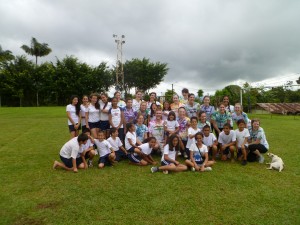
Westfield State University students pose with local kids in Costa Rica after a soccer match. Westfield State teachers-in-training travel to Costa Rica, teaching others and learning about themselves. (Photo submitted)
WESTFIELD – Seventeen Westfield State University students and two faculty members traveled to Costa Rica as part of the short term study abroad course “A Costa Rican Intercultural and Tropical Ecology Experience for Educators.”
The course centered around providing early childhood, elementary, and special needs teaching candidates with the opportunity to better understand differences between teaching and learning within the context of and through engagement with another culture. Costa Rica is widely known for its abundance of different species; this particular Westfield State course encourages students to develop their own understanding of natural science including biodiversity, tropical habitats, and ecology. The course was led by Professor of Education Trudy Knowles, and Assistant Professor of Education Wilma Ortiz.
The group traveled around Costa Rica including stops in La Fortuna, Monteverde, the Arenal Volcano, Manuel Antonio, and Rancho Margot.
Ortiz said the students learned to appreciate things they took for granted while visiting ecological sites, especially ones deep in the rainforest away from civilization.
“Poco Sol Field Station was eye opening for the students because there was no hot water, no TV or Internet/phone access,” Ortiz said. “We were literally disconnected from the outside world, for two nights and three days.”
Student Samantha Morin ’14 of Easthampton said at first the trip to Poco Sol Field was uncomfortable, but the group quickly adjusted and became transfixed with the rainforest.
“The last day at Poco Sol, I don’t think any of us wanted to leave,” Morin said. “Where we used to fear going into the rainforest, we now looked forward to it. We all became, in my eyes, wild, and completely enamored with nature.”
Despite traveling to a Spanish-speaking country, the course did not require students to take any prerequisite Spanish classes. Morin said she was drawn to the course because of the diversity aspect.
“I liked the idea of teaching in a different country,” Morin said. “I just wanted to experience a new culture, try new things, and be completely out of my comfort zone.”
In addition to ecological site visits, students visited local schools to teach lessons to non-English speaking students. Prior to traveling, Westfield State students laid out lesson plans to teach public school children in Costa Rica. However, when they arrived, most of the public schools were closed because of a strike. Instead, the students visited with different schools than they had originally anticipated and adapted their lesson plans to fit the needs of the new schools. Ortiz said the last minute rearranging of the lesson plans was a useful workshop for future teachers.
“This impromptu changed of plans was an incredible experience everyone got to appreciate after all, because future teachers need to be flexible, and ready to ‘hit the road running,’” Ortiz said. “Students were excited and nervous at the same time. They worked collaboratively and diligently.”
The course aimed to break down language barriers, a task Morin said resonated with her.
“I highly suggest to any teacher or future teacher to try it,” Morin said. “You will really understand what it’s like to be a language learner and confused, when you might have thought you knew everything. This course really made you feel what it is like for those students – confusing, inspiring, sometimes frustrating.”
In addition to the goals laid out by the course description, Ortiz said the students came to some important realizations.
“They learned how to care for each other; they got to know each other better and support each other more,” Ortiz said. “Also, the trip forced students to step outside of the comfort zone, and this was paramount.”

